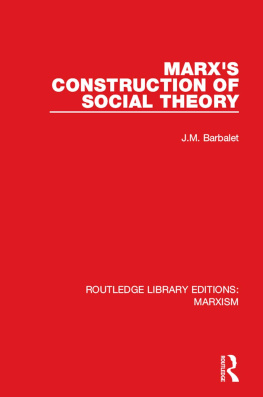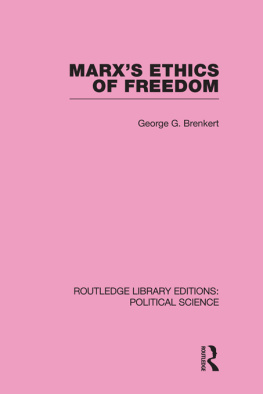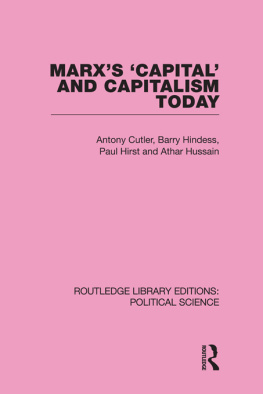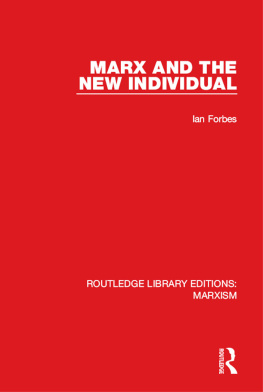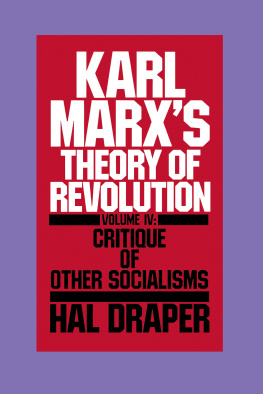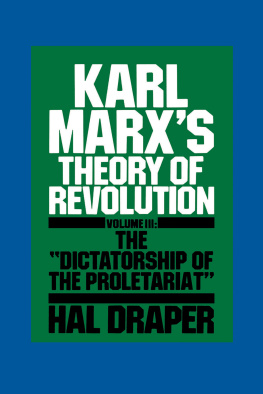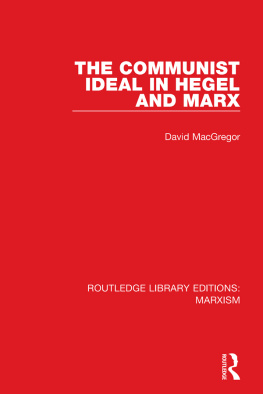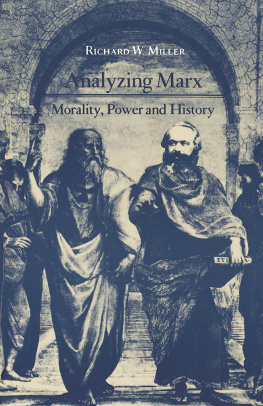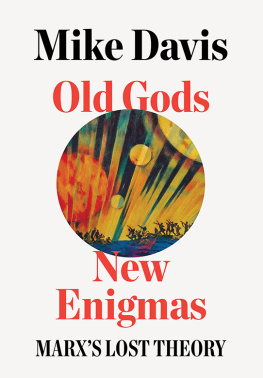ROUTLEDGE LIBRARY EDITIONS: MARXISM
Volume 18
MARXS CONSTRUCTION OF SOCIAL THEORY
MARXS CONSTRUCTION OF SOCIAL THEORY
J.M. BARBALET
First published in 1983
This edition first published in 2015
by Routledge
2 Park Square, Milton Park, Abingdon, Oxon OX14 4RN
and by Routledge
711 Third Avenue, New York, NY 10017
Routledge is an imprint of the Taylor & Francis Group, an informa business
1983 J.M. Barbalet
All rights reserved. No part of this book may be reprinted or reproduced or utilised in any form or by any electronic, mechanical, or other means, now known or hereafter invented, including photocopying and recording, or in any information storage or retrieval system, without permission in writing from the publishers.
Trademark notice: Product or corporate names may be trademarks or registered trademarks, and are used only for identification and explanation without intent to infringe.
British Library Cataloguing in Publication Data
A catalogue record for this book is available from the British Library
ISBN: 9781-13885502-1 (Set)
ISBN: 9781-31571284-0 (Set) (ebk)
ISBN: 9781-13888774-9 (Volume 18) (hbk)
ISBN: 9781-31571395-3 (Volume 18) (ebk)
Publishers Note
The publisher has gone to great lengths to ensure the quality of this reprint but points out that some imperfections in the original copies may be apparent.
Disclaimer
The publisher has made every effort to trace copyright holders and would welcome correspondence from those they have been unable to trace.
J.M. Barbalet
Marxs construction of social theory
First published in 1983
by Routledge & Kegan Paul plc
39 Store Street, London WC1E 7DD,
9 Park Street, Boston, Mass. 02108, USA,
296 Beaconsfield Parade, Middle Park,
Melbourne, 3206, Australia, and
Broadway House, Newtown Road,
Henley-on-Thames, Oxon RG9 1EN
Set in Press Roman
and printed in Great Britain by
T.J. Press Ltd, Padstow, Cornwall
J.M. Barbalet, 1983
No part of this book may be reproduced in any form without permission from the publisher, except for the quotation of brief passages in criticism.
Library of Congress Cataloging in Publication Data
Barbalet, J.M., 1946-
Marxs construction of social theory.
Bibliography: p.
Includes index.
1. Marx, Karl, 18181883 Sociology. 2. Communism and social sciences. 3. Communism and society. 4. Marxian school of sociology. I. Title.
HX39.5.B2863 1983 335.401 834582
ISBN 07100-95406
Contents
I am indebted to friends and colleagues too many to be enumerated who contributed to the writing of this book. Any shortcomings which remain in it are entirely the result of my own efforts. Professor Graeme Duncan, of the University of East Anglia, introduced me to Marxist theory, and Mr Paul Nursey-Bray, of Adelaide University, supervised the thesis on which this book is based. I am grateful to them both. Professor Ralph Miliband, of Brandeis University, and Dr Michael Evans, of Manchester University, offered many helpful suggestions in their capacity as examiners. Professor Frank Jones, of the Australian National University, kindly made facilities available for some of the rewriting. Jacki Gray and Vivienne Read are to be thanked for typing the manuscript. The continuous and enduring support and encouragement so essential for thinking and writing came in abundance from my family. My wife Margaret and son Tom especially are thanked for their invisible but indispensable contribution to this book.
In this book is presented an argument about Marxs construction of social theory. The building metaphor has a certain appropriateness in the present context, for it highlights three major areas of interest which are developed in the chapters which follow. First, we are concerned with Marxs search for a sound epistemology or foundation on which to build a social theory. Second, there is a concern with the way in which Marx continually modifies the concepts theoretical building blocks or bricks he uses in putting up the structure, and the different functions they are given in holding it together. Finally, we examine the manner in which construction entails that at various times the theoretical structure itself is in different ways dismantled, reorganised and in which some material is replaced with other theoretical fabric.
Recent scholarly interest in Marx has focused on two general problems, first the theoretical content of his early thought and second, its intellectual background, in particular its relation to the Hegelian tradition. A number of positions have been taken in the critical literature, but two alternatives immediately present themselves as influential. One argues that Marxs early thought, drawn from an Hegelian background, constitutes the theoretical foundation upon which his later thought is developed. The other maintains that Marxs early thought, drawn from an Hegelian background, does not constitute the theoretical foundation upon which his later thought is developed. These may be characterised as the continuity thesis and the discontinuity thesis. The argument to be presented here takes issue with both of these interpretations of Marxs development.
The common assumption, that Marxs theory bears some relation to Hegels, while in a sense uncontestable, is quite misleading. Not only does the emphasis on the Hegelian background of Marxs thought present an inadequate picture in itself, it also leads to the neglect of other intellectual influences on Marx which were in many ways more important. It will be demonstrated that in his early writings, where Hegels influence is almost uniformly considered to be at its strongest, Marxs social and political theory is heavily coloured by English political economy, liberal social thought and the political doctrines of a revolutionary democratic tradition. Any influence of Hegel on Marx was through the prism of a milieu dominated by Feuerbach. The significance of Feuerbach for Marxs theoretical formation and development is considered in detail below.
On the question of Marxs development, it will be suggested that there is a continuity in Marxs thought. Many of his early concerns were not abandoned, but formed the first exploratory attempts to grapple with a set of problems with which Marx continued to deal and of which he continued to achieve a deeper grasp. It will also be argued, however, that alongside this continuity of interests in Marx there is a significant theoretical discontinuity. Marxs explanation of the democratic state, for instance, of alienation and class, to name but some of the concepts Marx continued to use in his writings, are understood through different theoretical frameworks at different stages of his development.
In his early critique of Hegel Marx outlined the idea that the development of the political state must be conceived in terms of human history. It is the elaboration of this idea which leads Marx to formulate a number of theoretical accounts of history and society, and on which he attempted to found a theory of revolution and human emancipation. Up to 1845 Marx seemed to be dissatisfied with the results of his research, for he abandoned several different theories almost as soon as they had been formulated. Marx does find his intellectual feet, however, with

